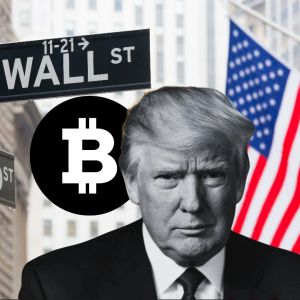Wall Street is finally warming up to crypto, thanks to President Donald Trump’s aggressive push to boost the industry, especially after Jan. 23rd’s executive order for the National Digital Asset Stockpile. Barely a week into Trump’s second term, a Jan. 25 report by CNBC says top financial executives are falling in line with his pro-crypto policies in a major pivot for an industry that previously kept Bitcoin at arm’s length. Trump’s executive order emphasizes “protecting and promoting” the use and development of cryptocurrencies. Wall Street CEOs jump in In Davos, Switzerland, at the World Economic Forum, Morgan Stanley CEO Ted Pick said, “We’ll be working with Treasury and the other regulators to figure out how we can offer that in a safe way.” The bank is known for pushing boundaries in crypto before most of its peers. In 2021, Morgan Stanley became the first major U.S. institution to give wealthy clients access to bitcoin funds. By 2024, it had authorized its advisors to pitch bitcoin ETFs to clients. ‘Crypto president’ Trump is surrounding himself with pro-crypto allies to make sure his agenda sticks. Paul Atkins, a former SEC commissioner under George W. Bush, has been nominated to lead the SEC. Howard Lutnick, the CEO of Cantor Fitzgerald, has been tapped as Commerce Secretary. Scott Bessent, a hedge fund manager with a Bitcoin obsession, is Trump’s pick for Treasury Secretary. If confirmed, Scott will oversee the IRS and the Financial Crimes Enforcement Network—two agencies critical to creating clear tax and compliance policies for crypto. Trump’s policies are addressing longstanding frustrations from Wall Street. One major complaint has been the SEC’s 2022 accounting rule, known as SAB 121, which forced banks to classify cryptocurrencies as liabilities on their balance sheets. This rule discouraged banks from offering crypto custody services by imposing strict capital requirements. But as Cryptopolitan reported on Jan. 23rd, the SEC rescinded SAB 121, removing one of the biggest roadblocks for financial institutions looking to engage with digital assets. “Bye, bye SAB 121! It’s not been fun,” said SEC Commissioner Hester Peirce, who was tapped on Tuesday to lead a new “crypto task force.” Bank of America CEO Brian Moynihan, also speaking in Davos, welcomed the changes. “If the rules come in and make it a real thing that you can actually do business with, you’ll find that the banking system will come in hard on the transactional side of it,” he said. He pointed to crypto’s potential as a payment system, comparing it to Visa or Apple Pay. However, Moynihan steered clear of endorsing cryptos as investment assets, calling that “a separate question.” Bitcoin’s price has of course responded to the optimism. On Monday, it surged to nearly $110,000—its highest price ever—before settling at around $106,000 as of press time. Banks lobby for clear rules as adoption grows While the SEC’s actions have brought a lot of excitement, Wall Street is still grappling with other regulatory issues. Anti-money laundering (AML) rules remain a sticking point, as inconsistent guidelines make it difficult for banks to serve certain industries. Jamie Dimon, the anti-crypto CEO of JPMorgan Chase, summed up the frustration on a podcast earlier this week: “There should be far cleaner lines about what we have to do and what we don’t have to do. We’ve been complaining about this for years. We need to fix it.” Wall Street CEOs are also lobbying for a unified federal standard to replace the patchwork of state laws that complicate compliance. Trump’s administration is being pressured to address these challenges as part of its broader effort to streamline crypto regulation. Though on Thursday, Trump criticized JPMorgan Chase and Bank of America, accusing them of denying services to conservative customers. The issue, known as “debanking,” has long been a Republican talking point. “We take this issue very seriously,” Bank of America said on Friday. “We will be engaging with the administration and Congress regarding the extensive government regulations that sometimes result in requirements to exit relationships.” The renewed focus on AML rules comes after a 2020 law aimed at overhauling these regulations fell short of its goals. Banks continue to push for clearer guidelines, arguing that inconsistent rules force them to walk away from certain clients and industries out of fear of penalties. Cryptopolitan Academy: How to Write a Web3 Resume That Lands Interviews - FREE Cheat Sheet


















